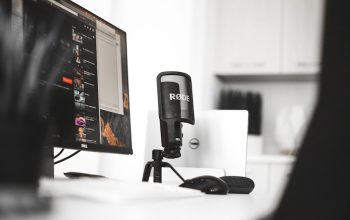In recent years, the popularity of self-help podcasts has surged, becoming a staple in the realm of personal development and mental wellness. These audio programs offer listeners a convenient and engaging way to explore various topics related to self-improvement, mental health, and emotional well-being. With the rise of digital media, individuals can now access a wealth of knowledge and insights from experts, thought leaders, and everyday people who share their experiences and strategies for overcoming life’s challenges.
The format of podcasts allows for a unique blend of storytelling, expert interviews, and practical advice, making complex psychological concepts more accessible to a broader audience. The appeal of self-help podcasts lies not only in their content but also in their format. Listeners can tune in while commuting, exercising, or even doing household chores, seamlessly integrating personal development into their daily routines.
This flexibility has made self-help podcasts an attractive option for those seeking to enhance their lives but who may struggle to find time for traditional self-help books or therapy sessions. As the podcasting landscape continues to evolve, it is clear that these audio resources are becoming an essential tool for many individuals on their journey toward self-discovery and improvement.
Key Takeaways
- Self-help podcasts are a popular and accessible resource for personal development and well-being.
- Listening to self-help podcasts can improve mental health by providing valuable insights and strategies for managing stress and anxiety.
- Top self-help podcasts for mental health include “The Happiness Lab,” “The Mindset Mentor,” and “The Tony Robbins Podcast.”
- Self-help podcasts can enhance personal growth by offering practical advice, motivation, and inspiration for achieving goals and overcoming challenges.
- Incorporating self-help podcasts into daily self-care routines can be a powerful tool for managing stress and finding motivation for a healthier, happier life.
Benefits of Self-Help Podcasts for Well-Being
Accessibility of Information
One of the most significant advantages of self-help podcasts is the accessibility of information. Unlike traditional self-help resources that may require extensive reading or attendance at workshops, podcasts can be consumed passively. This means that individuals can absorb valuable insights while engaging in other activities, making it easier to incorporate personal development into their busy lives.
Intimacy and Connection
The auditory nature of podcasts also allows for a more intimate connection with the host, fostering a sense of companionship and support that can be particularly beneficial for those feeling isolated or overwhelmed. Moreover, self-help podcasts often feature diverse perspectives and experiences, which can resonate with listeners on a personal level.
Relatability and Community
Hearing stories of triumph over adversity or practical strategies for coping with anxiety can provide hope and motivation. This relatability is crucial in the realm of mental health, where individuals may feel alone in their struggles. By listening to others share their journeys, listeners can gain validation for their feelings and learn that they are not alone in facing challenges. This sense of community can be incredibly empowering, encouraging individuals to take actionable steps toward improving their mental health and overall well-being.
Top Self-Help Podcasts to Improve Mental Health

The landscape of self-help podcasts is vast, with numerous options catering to various aspects of mental health and personal development. One standout podcast is “Therapy Chat,” hosted by Laura Reagan. This show delves into the nuances of psychotherapy and mental health topics, featuring interviews with therapists and mental health professionals who share their expertise and insights.
The discussions often cover themes such as trauma, mindfulness, and the therapeutic process itself, making it an invaluable resource for anyone looking to deepen their understanding of mental health. Another noteworthy podcast is “The Happiness Lab” with Dr. Laurie Santos.
Based on her popular Yale course on the science of well-being, this podcast explores evidence-based strategies for enhancing happiness and fulfillment in life. Dr. Santos combines research findings with relatable anecdotes, making complex psychological concepts digestible for listeners.
Each episode provides practical tips that individuals can implement in their daily lives to cultivate a greater sense of joy and satisfaction. For those seeking a more conversational approach, “Unlocking Us” with Brené Brown offers profound insights into vulnerability, courage, and connection. Brown’s engaging style invites listeners into deep discussions about emotional resilience and the human experience.
Her ability to blend research with storytelling creates an enriching listening experience that encourages personal reflection and growth.
How Self-Help Podcasts Can Enhance Personal Growth
| Metrics | Description |
|---|---|
| Number of Episodes | The total number of episodes available for listeners to access. |
| Duration | The average length of each episode, measured in minutes or hours. |
| Topics Covered | A list of the different topics or themes discussed in the podcast episodes. |
| Listener Engagement | The level of interaction and feedback from the audience, such as reviews, ratings, and comments. |
| Expert Interviews | The number of interviews with experts in the self-help and personal growth field. |
| Practical Tips | The frequency of practical tips and actionable advice provided in the episodes. |
Self-help podcasts serve as powerful catalysts for personal growth by providing listeners with tools and strategies to navigate life’s complexities. One way they achieve this is through the introduction of new concepts and frameworks that challenge existing beliefs or behaviors. For instance, many podcasts explore topics such as growth mindset, emotional intelligence, and resilience—concepts that can significantly impact how individuals approach challenges in their lives.
Additionally, self-help podcasts often feature actionable advice that listeners can implement immediately. Whether it’s practicing gratitude, setting boundaries, or developing healthier habits, these practical tips empower individuals to take charge of their personal development journey.
The step-by-step guidance provided by podcast hosts can demystify the process of change, making it feel more attainable. As listeners begin to see positive changes in their lives as a result of these strategies, they are likely to feel more motivated to continue their growth journey.
Utilizing Self-Help Podcasts for Stress Management
In today’s fast-paced world, stress management has become an essential skill for maintaining mental health and overall well-being. Self-help podcasts offer valuable resources for individuals seeking effective ways to cope with stressors in their lives. Many podcasts focus specifically on mindfulness practices, relaxation techniques, and cognitive-behavioral strategies that can help listeners manage stress more effectively.
For example, “The Mindful Kind” hosted by Rachael O’Meara provides insights into mindfulness practices that can be easily integrated into daily routines. Listeners can also benefit from episodes that address specific stressors such as work-related anxiety or relationship challenges. By tuning into discussions that resonate with their own experiences, individuals can gain new perspectives on how to approach these issues.
Furthermore, many self-help podcasts include guided meditations or breathing exercises that listeners can follow along with during episodes, providing immediate tools for stress relief. The communal aspect of listening to self-help podcasts also plays a role in stress management. Knowing that others are grappling with similar challenges can alleviate feelings of isolation and provide comfort during difficult times.
This shared experience fosters a sense of belonging and support that is crucial for mental health. As listeners engage with the content and connect with hosts or fellow listeners through social media platforms or online communities, they may find additional encouragement and motivation to prioritize their well-being.
Finding Motivation and Inspiration through Self-Help Podcasts

Motivation can often wane in the face of life’s challenges, but self-help podcasts serve as a powerful source of inspiration for many individuals. The stories shared by hosts and guests often highlight resilience and determination in overcoming obstacles, igniting a spark within listeners to pursue their own goals with renewed vigor. For instance, “The Tony Robbins Podcast” features interviews with successful individuals from various fields who share their journeys toward achievement.
These narratives not only provide practical advice but also instill a sense of possibility that encourages listeners to take action. Moreover, self-help podcasts frequently emphasize the importance of setting intentions and cultivating a positive mindset. Hosts often share techniques for visualizing success or creating vision boards—practices that can help listeners clarify their goals and maintain focus on what truly matters to them.
By incorporating motivational content into their daily routines through podcasts, individuals can create an environment conducive to growth and achievement. The interactive nature of many podcasts also enhances motivation levels. Some shows encourage listener participation through challenges or prompts that invite individuals to reflect on their progress or set new goals.
This engagement fosters accountability and encourages listeners to take ownership of their personal development journey. As they share their experiences with others or engage in discussions about the content, they may find additional motivation to stay committed to their aspirations.
Incorporating Self-Help Podcasts into Daily Self-Care Routines
Integrating self-help podcasts into daily self-care routines can significantly enhance one’s overall well-being. The beauty of podcasts lies in their versatility; they can be enjoyed during various activities such as commuting, exercising, or even while preparing meals. By intentionally setting aside time each day to listen to a self-help podcast, individuals can create a dedicated space for personal reflection and growth within their busy schedules.
For example, someone might choose to listen to a podcast episode during their morning commute as a way to set a positive tone for the day ahead. Engaging with uplifting content first thing in the morning can help cultivate a mindset focused on gratitude and possibility. Alternatively, incorporating podcasts into evening routines—perhaps while winding down before bed—can provide valuable insights that promote relaxation and reflection on the day’s events.
Additionally, listeners can enhance their experience by taking notes or journaling about key takeaways from each episode. This practice not only reinforces learning but also encourages deeper introspection about how the concepts discussed apply to one’s own life. By actively engaging with the material rather than passively consuming it, individuals can maximize the benefits of self-help podcasts as part of their self-care regimen.
Embracing Self-Help Podcasts for a Healthier, Happier Life
As society continues to navigate the complexities of modern life, self-help podcasts have emerged as invaluable resources for those seeking personal growth and improved mental health. With their accessibility, diverse perspectives, and practical advice, these audio programs empower individuals to take charge of their well-being in meaningful ways.
The journey toward self-improvement is deeply personal and often requires ongoing effort and commitment. However, the wealth of knowledge available through self-help podcasts serves as a guiding light for many individuals navigating this path. As more people discover the transformative power of these audio resources, it becomes increasingly clear that embracing self-help podcasts is not just a trend but a vital component of leading a healthier and happier life.
If you are interested in self-help podcasts, you may also enjoy reading the article “Hello World” on the Education Podcast Network blog. This article discusses the importance of embracing new opportunities and challenges in the world of education. Check it out here.
FAQs
What are self-help podcasts?
Self-help podcasts are audio programs that focus on personal development, mental health, and well-being. They often feature discussions, interviews, and advice on topics such as self-improvement, mindfulness, motivation, and overcoming challenges.
How can self-help podcasts benefit me?
Self-help podcasts can provide valuable insights, strategies, and inspiration for personal growth and self-improvement. They can offer practical tips, guidance, and support for managing stress, building resilience, and enhancing overall well-being.
What are some popular self-help podcasts?
Some popular self-help podcasts include “The Tony Robbins Podcast,” “The Tim Ferriss Show,” “The School of Greatness with Lewis Howes,” “The Happiness Lab with Dr. Laurie Santos,” and “The Life Coach School Podcast with Brooke Castillo.”
Where can I find self-help podcasts?
Self-help podcasts are widely available on various podcast platforms such as Apple Podcasts, Spotify, Google Podcasts, and Stitcher. Many self-help podcasts also have their own websites where listeners can access episodes and additional resources.
Are self-help podcasts a substitute for professional therapy or counseling?
Self-help podcasts can provide valuable insights and strategies for personal development, but they are not a substitute for professional therapy or counseling. If you are dealing with serious mental health issues, it is important to seek support from a qualified mental health professional.



